NONFICTION
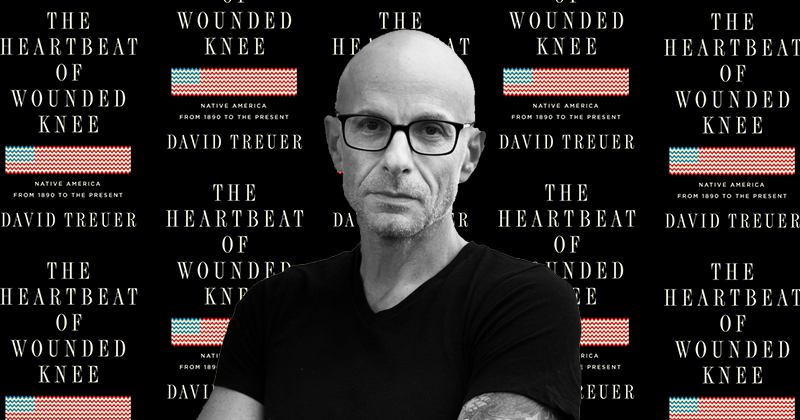
David Treuer, author of The Heartbeat of Wounded Knee (Riverhead)
Who do you most wish would read this book?
I think I was about thirty before I truly felt the power of belonging to a tribe. I had always known, of course, that I was Ojibwe; that I was from the Leech Lake Reservation; that my family was from the small village of Bena on that reservation. I knew it, but I don’t think I felt it. And I think, now, that the raw comfort, the feeling of intense belonging, that came over me later in life had been kept from me, by the idea of what being Native meant dominant in American discourse and dominant in my own mind. I had internalized the idea (among others) of the “disappearing” and disappeared Indian. But once I felt what it meant to belong to tribe, to claim and be claimed by one, I knew I had to write into the face of the idea of our powerlessness. And so—who do I most wish would read this book?—me at 15, 20, and 25; my tribe then and now; and the rest of America now and beyond. Because we need to remember our continued and excellent existence in order know our worth.
What’s the best book you read this year?
Roxanne Gay’s Bad Feminist and Mohsin Hamid’s Exit West (I can’t pick just one).
Who was the first person you told about making this list?
I started writing The Heartbeat of Wounded Knee in January of 2016 the week my father died and in the same month I began dating the woman I’d eventually marry. In ways I’m only really recognizing now I was able to begin the task because of my father’s example and I was only able to finish it because Abi Levis. My father was an immigrant: a Holocaust survivor, he fled Austria and found refuge in America. And he made it his life’s work to find a way to make the troubled country that had accepted him better. We are all responsible for the actions of our country and this being so we all must carry that weight in our own way. My father felt passionately that since America saved him he must do his part to save her, often from herself. It was that belief—in country, in justice, and in Native American communities—that guided him. This book is my own way of trying to make it better. So I wish I could have told him about being a finalist of the National Book Award. And Abi, my wife–while busy with her own brilliant career as an opera singer and her passionate care for her own father–made schedules for me, and cooked for us, and was a patient listener and often a first-reader as the work spooled out of my keyboard. She was the first person I could and did tell.
How do you tackle writer’s block?
Funny thing. I don’t really get writer’s block. Getting the words out has never been the hard part. Sometimes, of course, they don’t come as easily. But I have always loved being edited and have managed to create within myself my own much smaller, much less intelligent editor. So if the words aren’t right I print out the previous chapter and using a pencil I edit. And that usually gets me back on track.
What is one story, fact, or concept from the period of history you cover in your book that you think everyone should know (but most people don’t)?
Just one story? One fact? I suppose the reason I only really write long-form narratives is that I feel crowded otherwise, so it’s terribly hard to pick one thing I hope people know. But if I had to pick I would want to draw attention to Ponca chief Standing Bear. In the late 1870s, after his tribe had been illegally removed to Indian Territory without supplies, his son (along with a third of the tribe) died of starvation. Standing Bear had promised his son he would bury his bones alongside those of his ancestors in present-day Nebraska. As Standing Bear traveled north he and his entourage was arrested and detained. In the eyes of the government he and his tribe lacked even the most basic rights non-citizens and foreign visitors to the U.S. have, among them the right to move freely about the country. In the eyes of the government he wasn’t even a person. Instead of sending Standing Bear back to Oklahoma General George Crook (who had spent a lifetime fighting Indians) gave Standing Bar refuge at Fort Omaha and helped Standing Bear sue the government.
The judge’s decision in favor of Standing Bear ran to eleven pages. It was the first time a U.S. court had recognized the person-hood of an American Indian. And this was after the Civil War. Standing Bear traveled on and buried his son and remained in his tribal homelands in northern Nebraska for the rest of his life. In his story I find so many important things woven together: a terrible history of mistreatment; the passionate hard work of Indian allies like Crook, journalists, and the judge; and the stubborn soulful insistence of Standing Bear that he be allowed to live has he pleased. In this one moment we can see the best and worst of the country and the ability and willingness of American Indians to make their own history and to help steer the country to a better, more humane, place.
*
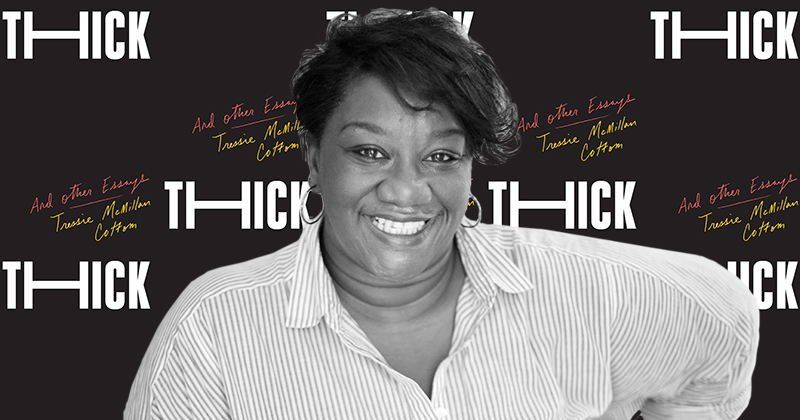
Tressie McMillan Cottom, author of Thick: And Other Essays (The New Press)
Who was the first person you told about making this list?
The first person was Tara Grove, my editor at The New Press. No one has been my partner in crime more than Tara has been. I’ve said it before, and I suspect I’ll say it for the rest of my life: having a black woman editor who was smart enough to edit me, confident enough to push back, and had enough faith in me to allow my voice to make it through the editorial process, was the difference between this book being filler and being the book that it is today. I wanted her to know that her investment in me and in this project had all been worth it.
How do you tackle writer’s block?
I’ve actually never had writer’s block. And I don’t say that to humble brag, although I did choose to answer this question. Are there times when I think I want to write and feel like I should be writing, but I’m not writing? Yes, absolutely, and I think that’s what people mean when they talk about writer’s block. But I understand that experience differently. If I want to write but cannot write, to me it means that I’m not yet ready to write. The way I resolve that is by reading. If I’m not ready to write, it’s because I haven’t finished reading. So I keep reading, and I try to keep experiencing other people’s ideas and experiences until I am once again ready to write. Writing may be work, but it isn’t a job; it will not necessarily conform to the dictates of a 9 to 5. I know many writers say they just sit butt-in-seat every day from 6 a.m.–4 p.m. and that is how they get it done. I can do that, but I can’t do it every day indefinitely and continue to write well. Since I endeavor to write not just a lot or frequently, but to write well, I have to allow time for myself to read and think. It’s just a reimagining of what writer’s block is: not the absence of writing, but rather a part of pre-writing, immersing yourself in lived experiences so you actually have something to write about.
Which book(s) do you return to again and again?
Great question. I do have a set I’ve kept with me as I’ve traveled through life. When I don’t know what else to do, to read, to write, or I’ve taken in too many other peoples’ voices and need to get back in touch with my own, I always go back to the 20th century African American writers whose work I grew up on. Zora Neale Hurston, Gloria Naylor, Baldwin’s essays… I like to get back in touch with the way that my people speak. The rhythm of our language inspires me. I return to Their Eyes Were Watching God, The Bluest Eye—these are my comfort food books. Bailey’s Cafe, The Women of Brewster Place. To me, they are like reading Psalms in the Bible. You know how they end, and you know what their messages are, but hearing their rhythms takes me back into my comfort zone.
If you have a day job, what is it? How do you negotiate writing and working?
I have four day jobs. I am a tenured professor, I run a podcast with my very good friend Roxane Gay, I’m black, and I’m a woman. How do I negotiate writing and working? Lately, I don’t. I am miserable when I’m not writing or pre-writing or post-writing and worried about pre-writing again, so I don’t go too far away from it, because the people who care about me want me to get back to writing as quickly as possible. When I am writing, I am my fullest self. Maybe not my happiest self, but certainly my most joyful, well-adjusted self. There is no win-win—something always loses when I choose to write—but I make that choice, because writing is important to me. That usually entails clearing my travel schedule, letting my house fall down around me, and calling in reserves to help me stay fed, upright, and human while I work on my craft.
If you could magically insert one fact, argument, or piece of knowledge from your book into every American’s mind, what would it be?
The answer to this depends on the audience. Black people understand structure as opposed to individuals just fine, if only because we understand that there is something bigger than us that shapes our life chances. We know that whiteness exists and that it shapes what’s possible for us. Even though we work really hard not to believe in it, we know it’s there. I wish white people knew that—that there was something bigger than themselves that shaped their life chances. Maybe if they understood class as a function of their own racial identity, they would develop an identity that did not necessitate oppressing other people.
I wish our popular discourse better understood the difference between individual prejudice, racist acts, behaviors, and feelings, and things like systematic exclusion, oppression, and marginalization. Something can be true for a significant number of people and not be true for everyone. Both of those things can happen at the same time and do every day, in fact. That’s one of the great analytical tools we borrow from sociology, though not just sociology. There are other forms of knowledge and knowing something is bigger than the individual self. In the West, our minds don’t hold onto that very well. It’s antithetical to the idea of being American, and I think that’s why we find ourselves faced with a poverty of public discourse about the really big problems that face us as people.
*
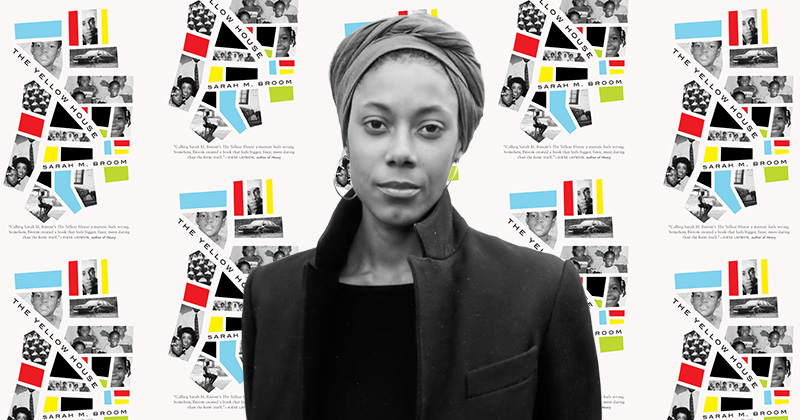
Sarah M. Broom, author of The Yellow House (Grove Press)
What’s the best book you read this year?
Saidiya Hartman’s Wayward Lives, Beautiful Experiments.
What time of day do you write?
Early morning, around 4 am, before the noise.
How do you tackle writer’s block?
Show up. Stay. On repeat. Ritual and routine.
Which book(s) do you return to again and again?
W.G. Sebald, The Emigrants. Eva’s Man and Corregidora by Gayl Jones. Everything Toni Morrison ever wrote and I mean everything. Autobiography of a Mother by Jamaica Kincaid. Joan Didion, Political Fictions. Albert Murray, Train Whistle Guitar.
Which non-literary piece of culture—film, tv show, painting, song—could you not imagine your life without?
Sonny Sharrock’s “Black Woman.” The art of Whitfield Lovell.
*
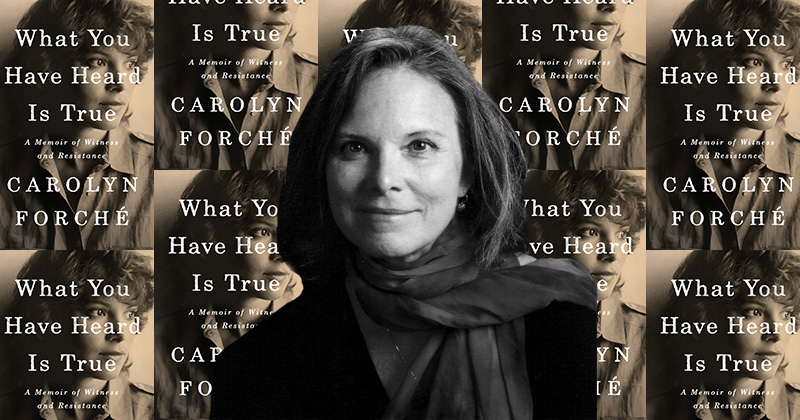
Carolyn Forché, author of What You Have Heard Is True: A Memoir of Witness and Resistance (Penguin Press)
Who do you most wish would read this book?
I most wish that this book would find readers among the young Salvadorans who fled to the United States with their parents during the war. It is for them, and others of their generation, who might want to learn about one young woman’s journey to awareness.
What do you always want to talk about in interviews but never get to?
I would like to be able to speak more about the families now fleeing Central America, refugees of war’s aftermath, those seeking asylum with us now.
Who was the first person you told about making this list?
In my heart, I told Leonel Gomez Vides, my mentor and guide, as I was alone when I heard the news, and he is gone, but very much still within me.
What time of day do you write?
I write in the early morning, beginning an hour before the sun, because the world is quiet then, and in that liminal state I can reach more deeply into memory.
What is it about this story that needed to be told in prose rather than poetry?
I always knew that if I were to tell this story fully, it would require the capaciousness of prose—I would have to live through it again, to assemble the thousand memories back into the world, retrace my journey, let the voices of all who were there speak again on the page and come alive. To do that, I did not have to give up poetry, but I had to give the writer in me other freedoms.
*
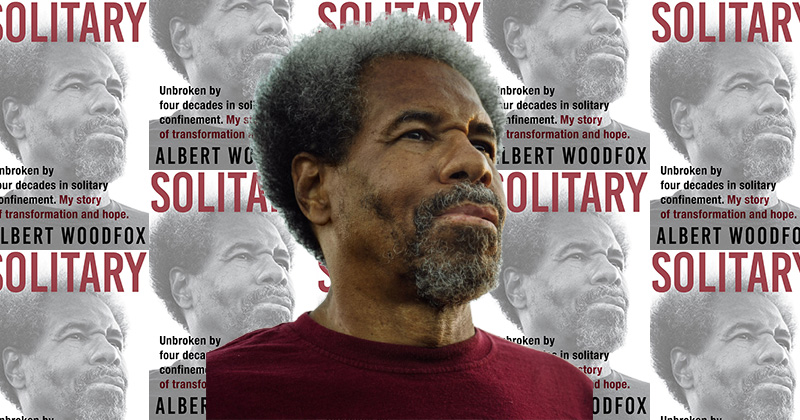
Albert Woodfox, author of Solitary (Grove Press)
Who do you most wish would read this book?
Everyday working-class people. Because I think they can relate to my life and what I’ve had to endure.
What do you always want to talk about in interviews but never get to?
The lack of integrity in political leaders today.
Who was the first person you told about making this list?
Leslie George, who wrote the book with me.
Which book or books do you return to again and again?
A Different Drummer, by William Melvin Kelley, because it is the book that awakened my consciousness.
Which non-literary piece of culture could you not imagine your life without?
R&B music.
What’s the best writing advice you’ve ever received?
To be honest.
What was it like to bring someone else into the process of sharing your personal story?
It was very painful, because I realized that I would have to relive all the horrible moments of my life through conversation.
Previous Article
On the Missing History at New York's Battleship Intrepid MuseumNext Article
Life Inside Guantánamo:An Oral History



